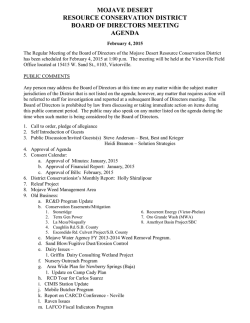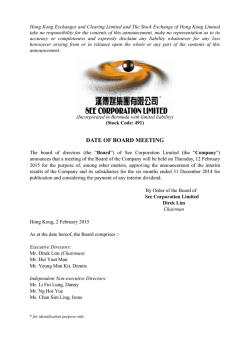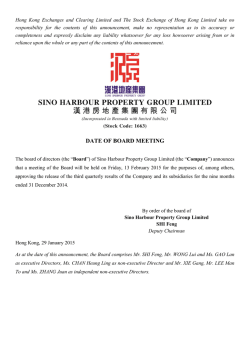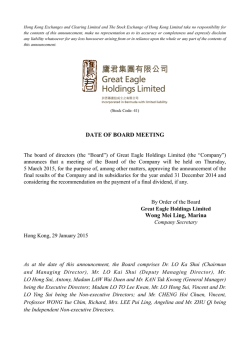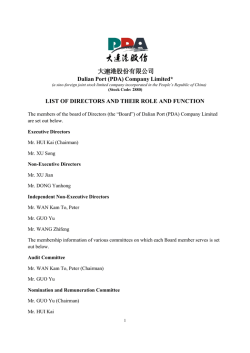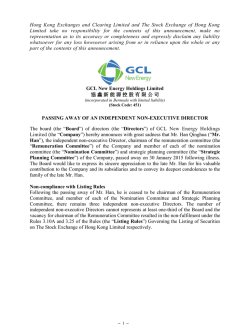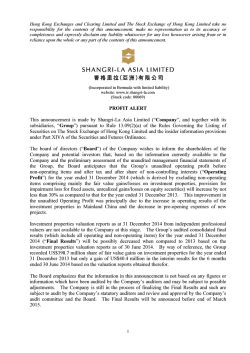
BYLAWS PROPOSED CHANGES 2015
Revised:9/1/14
Larry Posner 11/4/2014 8:06 AM
BYLAWS
OF
WESTERN SOCIETY OF ALLERGY AND IMMUNOLOGY
Effective Date: January 28, 2015
ARTICLE I
Deleted: : 7/24/02
larry posner 8/3/2014 6:41 PM
Deleted: 21, 1992
NAME AND PRINCIPAL OFFICE
Section 1. Name. The name of this corporation shall be WESTERN SOCIETY OF
ALLERGY, ASTHMA AND IMMUNOLOGY.
Section 2. Principal Office. The principal office of the corporation is at 14113 NW
The board of directors by a majority vote may change the
location of the principal office.
Tradewind Street, Portland, OR 97229
Section 3. Additional Offices. The corporation may have other offices, as the board of
directors may designate.
ARTICLE II
PURPOSE
The purposes for which the corporation is organized shall be:
1. For scientific and educational purposes within the meaning of Section 501 (c)(3)
of the Internal Revenue Code of 1986 as amended.
2. To unite the qualified allergists, their nurses, and their physician's assistants in a
representative organization for the promotion, improvement, and advancement of allergy.
3. To study the scientific, economic, social, educational and political aspects of
medicine in order to secure and maintain the highest standard of practice in allergy, and to propose
and recommend necessary changes in existing or contemplated medical programs.
4. To perpetuate the best traditions of medicine and medical ethics.
5. To cooperate with other organizations of like purpose.
Karol Anderson 7/29/2014 6:56 PM
Deleted: 3181
larry posner 8/3/2014 6:43 PM
Deleted: 3181 S.W. Sam Jackson Park Road,
Portland, Oregon 97201.
1.
Larry Posner 11/6/2014 8:46 AM
Deleted:
Larry Posner 11/6/2014 8:46 AM
ARTICLE III
MEMBERS
Deleted:
Section 1.
Classes of Members. The corporation shall have six classes of
members: Active Members, Associate Members, Honorary Members, Inactive Members, Military
Members and Affiliate Members.
Section 1.1. Active Members. A Doctor of Medicine or Osteopathy licensed to
practice in their country of residence and his or her state or province, or who is a member of the
medical corps or a branch of the armed services is eligible to apply for active membership in this
corporation. Also eligible for active membership are non-physician medical scientists with a Ph.D.
degree and who are recognized by their scientific peers for their scientific accomplishments and
who have made material and substantial contribution to the field of allergy or immunology.
Section 1.2.
Associate Members.
An intern, resident or fellow in allergyimmunology training or a Doctor of Medicine or Osteopathy, licensed to practice in their country of
residence, who is licensed to practice in his or her state or province, or who has a masters or
doctoral degree in basic sciences whose professional work and research relate to allergy and or
immunology, shall be eligible to apply for Associate membership in this corporation.
Larry Posner 11/6/2014 7:41 AM
Deleted: who properly applies the science allergy
and immunology to his or her practice, or a citizen of
the United States or Canada
Section 1.3. Honorary Members. Any person who has rendered distinguished
service to the field of allergy and immunology shall be eligible for Honorary Membership in this
corporation.
Section 1.4. Emeritus Members. Any member of this corporation who has ceased
to engage in the practice of medicine due to ill health, retirement or any other cause will be eligible
for transfer to Emeritus Membership upon filing of an application therefore with the
Secretary/Treasurer of the corporation.
Section 1.5. Affiliate Members. Any person who is a nurse practitioner, allergy
nurse or physician's assistant in allergy is eligible for Affiliate membership in this corporation.
Section 2. Qualifications. All members of this corporation must be of good moral
character, enjoy worthy personal reputations, and maintain a high professional standing.
Membership in this corporation shall constitute a privilege, and not a right, and may be terminated
pursuant to the procedures set forth in Article III, Section 5 of these Bylaws.
Larry Posner 11/6/2014 8:32 AM
Deleted:
Larry Posner 11/6/2014 8:33 AM
Deleted:
2.
The board of directors shall have the right to adopt from time to time such rules and standards as the
board may deem appropriate with respect to evaluation of the respective factors relevant to
determining eligible members. Nonpayment of dues for more than three year automatically
terminates membership in the corporation.
Section 3. Election to Membership. Members shall elected by majority vote of the
board of directors. An application for membership by any person holding the qualifications set
forth above shall be submitted in writing to the Secretary/Treasurer on a form prescribed by the
board of directors and the Secretary/Treasurer shall refer the applications to the board of directors.
Section 4. Rights and Duties of Members.
Section 4.1. Active Members. Active Members shall have the right to vote,
the privilege to attend and participate in all meetings of the corporation. They shall also be eligible
to hold any office of the corporation or receive any honor bestowed by the corporation.
Larry Posner 11/6/2014 8:32 AM
Deleted:
Larry Posner 11/6/2014 7:41 AM
Deleted: [
Larry Posner 11/6/2014 7:42 AM
Deleted: one
Larry Posner 11/6/2014 7:41 AM
Deleted: ]
Larry Posner 11/6/2014 8:39 AM
Deleted:
larry posner 8/3/2014 7:23 PM
Deleted: be nominated by the Membership
Committee and
larry posner 8/3/2014 7:23 PM
Deleted: Membership Committee
Section 4.2. Associate Members. Associate Members shall have the
privilege of attending and participating in all meetings of the corporation and will have the privilege
to vote, but not to hold office.
Section 4.3. Other Classes of Members. Emeritus, Honorary, and Affiliate
Members shall have all the rights and privileges of Active Members except that they shall not have
the right to vote or the right to hold office.
Section 5. Termination or Suspension of Membership. Upon filing and signing of written
charges by a member or members that any member does not devote a fair portion of his/her practice
to allergy, or has not maintained the qualifications hereinabove set forth for membership, or
practices in such a way as to violate the principles of professional conduct as set forth by the
American Medical Association, or acts in such a way as to be injurious to the interest or reputation
of the practice of allergy, the board of directors shall have the power to review said charges. The
charges or complaints shall state the precise acts, conduct, and nature of the charges with reasonable
particularity. The Secretary-Treasurer of the corporation shall present such complaints at the
subsequent meeting of the board of directors. The board of directors, after due consideration, will
determine, in the exercise of its sole discretion, what further action will be taken.
Section 5.1. Notice and Opportunity to be Heard. If it is determined that the
member should be expelled or suspended, or that the membership in the corporation should be
suspended or terminated, the board of directors will: (1.) give notice to the member, by first class or
certified mail at the last address of the member shown on the corporation's records, of the proposed
expulsion, suspension or termination no less than fifteen (15) days prior to the proposed expulsion,
suspension or termination and the reasons therefore; and
(2.) allow an opportunity for the member to be heard by the board,
orally or in writing, as determined in the sole discretion of the board, not less than five (5) days
before the proposed effective date of the expulsion, suspension or termination.
Larry Posner 11/6/2014 8:39 AM
Deleted:
... [1]
Larry Posner 11/6/2014 7:06 AM
Deleted:
... [2]
3.
ARTICLE IV
Larry Posner 11/6/2014 8:39 AM
Deleted:
MEETINGS OF MEMBERS
Section 1. Annual Meeting. An Annual Meeting of the members of this corporation shall
be held in conjunction with the annual scientific meeting, at such time and place as may be
designated by the board. At the annual meeting:
(1.) the President, and any other officer of the board of directors or the
President may designate, shall report on the activities and financial condition of the corporation; and
(2.) the members shall consider and act upon such other matters as may be
raised consistent with the notice requirements of ORS 65.214.
Section 2. Special Meetings. Special meetings of the members of the corporation
may be held on the call of the President, President-Elect and Secretary/Treasurer, or any two
members of the board of directors.
Section 3. Notice. The Secretary/Treasurer of the corporation shall deliver to each
member email or written notice of the place, date and time of such Annual Meeting or Special
Meeting of members no fewer than seven (7) days, or if notice is mailed by other than first class or
registered mail, no fewer than 30 nor more than 60 days before the meeting. Alternatively, the
notice will be posted on the member’s only section of the website. The notice shall include a
description of any matter or matters which must be approved by the members and, if a special
meeting, must include a description of the purpose or purposes for which the meeting is called. It
shall be sufficient to notify each member in person or by notices mailed to the most recent address
as it appears on the records of the corporation. If mailed, such notice shall be deemed to be
delivered when deposited in the United States mail with postage fully prepaid.
Section 4. Quorum. Those votes represented at a meeting of members shall
constitute a quorum.
Section 5. Act of Majority. The act of majority of the members present at a meeting
shall be the act of the members of the corporation unless the act of a greater number is required by
law or by these Bylaws or the Articles of Incorporation.
Larry Posner 11/6/2014 8:47 AM
Deleted:
Section 6. Voting. Each Active and Associate member shall be entitled to one vote
on each matter submitted to vote at a meeting of the members. There shall be no cumulative voting
on any election or other matter.
Section 7. Advisory Action. Notwithstanding that the control and management of
the business and corporate affairs of this corporation are vested in the board of directors, pursuant to
Article V of these Bylaws, the members of the corporation may propose action at annual or special
meetings, which proposals shall be advisory in nature.
Larry Posner 11/6/2014 8:40 AM
Formatted: Centered
4.
ARTICLE V
BOARD OF DIRECTORS
Section 1. Number and Term of Directors. The number of directors of the
corporation shall be not more than eight (8). Directors shall be elected at each annual meeting
thereafter. The Directors will move in succession from Director at large, Membership Director,
Secretary/Treasurer, Program Chair/President Elect, President and Immediate Past President. Each
director shall be elected to serve no less than a six (6) year term. The directors shall serve for their
respective term designated in the Articles of Incorporation. The vacancy in the board of directors
shall be filled by the vacancies procedure set forth in Section 2, below.
larry posner 8/3/2014 6:51 PM
Deleted: General
Section 2. Vacancies. Any vacancy occurring in the board of directors may be
filled by the affirmative vote of a majority of the remaining directors. If the directors remaining in
office are less than a quorum, then the vacancy shall be filled by a majority of remaining directors.
Unless otherwise provided, a director filling a vacancy shall be elected for the unexpired portion of
the term of his or her predecessor in office. A director will be chosen exclusively from the twelve
(12) western states that make up the WSAAI.
Section 3. Additional Directors. Any directorship to be filled by reason of any
increase in the number of directors shall be filled by election at an annual meeting or at a special
meeting of members called for that purpose, unless otherwise provided in the Articles of
Incorporation.
Section 4. Powers of Directors. The business and affairs of the corporation shall be
managed by its board of directors, except as otherwise provided by law or the Articles of
Incorporation or these Bylaws.
Section 5. Standards of Conduct. Pursuant of Oregon Revised Statues ("ORS")
Section 65.357 the following standards of conduct shall apply:
Larry Posner 11/6/2014 8:40 AM
Deleted:
(1.) A director shall discharge the duties of a director, including the duties as
a member of a committee, in good faith, with the care an ordinarily prudent person in a like position
would exercise under similar circumstances and in a manner the director reasonably believes to be
in the best interests of the corporation.
(2.) In discharging the duties of a director, a director is entitled to rely on
information, opinions, reports, or statements, including financial statements and other financial data,
if prepared or presented by:
(a.) One or more officers or employees of the corporation whom the
director reasonably believes to be reliable and competent in the matters presented;
(b.) Legal counsel, public accountants, or other persons as to matters
the director reasonably believes are within the person's professional or expert competence; or
(c.) A committee of the board of directors of which the director is not a
member if the director reasonably believes the committee merits confidence.
Larry Posner 11/6/2014 8:43 AM
Formatted: Centered
5.
(3.) A director is not acting in good faith if the director has knowledge
concerning the matter in question that makes reliance otherwise permitted by subsection (2) of this
section unwarranted.
(4.) A director is not liable for any action taken as a director or any failure to
take any action, if the director performed the duties of the director's office in compliance with this
section.
(5.) A director shall not be deemed to be a trustee with respect to the
corporation or with respect to any property held or administered by the corporation, including
without limit, property that may be subject to restrictions imposed by the donor or transferor of such
property.
Section 6. Place of Annual or Special Meetings. The Annual Meeting of the board
of directors shall be held immediately preceding the annual meeting of the members in conjunction
with the annual scientific meeting. A special meeting may be held either within or without the state
of Oregon.
Section 7. Regular Meetings. Regular meetings of the board of directors may be
held upon notice, or without notice, and at such time and place as shall from time to time be
determined by the board.
Section 8. Special Meetings. Special meetings of the board of directors may be
called on two day's notice to each director, either personally by telephone, by mail, by fax, or by email of the date, time and place of the meeting. Unless required by Oregon law or these Bylaws, the
notice need not describe the purpose of the special meeting. Special meetings may be called by the
President or by a majority of the board of directors. The special meeting may be held by telephone
through the use of a conference telephone or similar communications equipment.
Section 9. Quorum. A majority of the total number of directors shall constitute a
quorum for the transaction of business. The act of the majority of the directors present at a meeting
at which a quorum is present shall be the act of the board of directors.
Section 10. Action Without A Meeting. Any action that may be taken by the board
of directors at a meeting may be taken without a meeting if consent in writing, setting forth the
action so to be taken, shall be signed by all of the directors. Action taken under this Section is
effective when the last director signs the consent, unless the consent specifies an earlier or later
effective date. A consent signed under this Section has the effect of a meeting vote and may be
described as such in any document.
Section 11. Compensation. The directors shall be reimbursed for reasonable
expenses related to attendance at board of directors' meetings, The directors will not be reimbursed
for travel and lodging directly related to the Annual meeting.
larry posner 8/3/2014 6:59 PM
Deleted: not be reimbursed for their expenses, if
any,
Larry Posner 11/4/2014 8:09 AM
Deleted: for
larry posner 8/3/2014 6:59 PM
Deleted: unless approved by majority vote of the
board of directors.
Larry Posner 11/6/2014 8:43 AM
Formatted: Centered
6.
Section 12. Presumption of Assent. If a director of the corporation is not present at
a meeting of the board of directors at which action on any corporate matter is taken, he/she shall be
presumed to have assented to the action taken unless a wrriten dissent is filed. He/She shall file the
dissent twith the person acting as the secretary of the meeting before the adjournment thereof or by
certified mail to the Secretary of the corporation immediately after the adjournment of the meeting.
Such right to dissent shall not apply to a director who voted in favor of such action.
Section 13. Waiver of Notice. Whenever any notice is required to be given to any
director of the corporation under the provisions of these Bylaws or under the provisions of the
Articles of Incorporation or under the provisions of ORS Chapter 65, such notice may be oral or
written unless otherwise specified for a particular kind of notice. A director may at any time waive
any such required notice. The waiver must be in writing, signed by the person or persons entitled to
such notice, whether before or after the time stated therein, must specify the meeting for which
notice is waived and must be filed with the minutes or corporate records. Presence at any meeting
shall be deemed waiver of notice for such meeting unless, at the beginning of the meeting, or
promptly upon the objecting director's arrival, the director objects to holding the meeting or
transacting business at the meeting and does not thereafter vote for or assent to any action taken at
the meeting.
ARTICLE VI
OFFICERS
Larry Posner 11/4/2014 8:10 AM
Deleted: A
Larry Posner 11/4/2014 8:10 AM
Deleted: who
Larry Posner 11/4/2014 8:13 AM
Deleted: he or she shall file a written dissent to
such action
Larry Posner 11/4/2014 8:14 AM
Deleted: shall forward such dissent
Larry Posner 11/6/2014 8:43 AM
Deleted:
Section 1. Officers. The principal officers of the corporation shall be the Past
President, President, President-Elect/Program Chairman, and the Secretary-Treasurer. The
corporation may have other officers, who shall hold their office for such terms shall have such
authority and perform such duties as shall be determined by the board of directors.
Section 2. Appointment of Officers. The initial officers shall be appointed by the
board of directors at the organizational meeting. Thereafter, the officers shall be nominated by the
board of directors annually and elected by the members at the annual meeting.
Section 3. Vacancies. If the office of any officer becomes vacant for any reason, the
vacancy shall be filled by the board of directors.
Section 4. Standards of Conduct. Pursuant to ORS 65.377 the following standards
of conduct shall apply:
(1.) An officer with discretionary authority shall discharge the duties of an
officer under that authority:
(a.) In good faith;
(b.) With the care an ordinarily prudent person in a like position
would exercise under similar circumstances; and
(c.) In a manner the officer reasonably believes to be in the best
interests of the corporation.
Larry Posner 11/6/2014 8:44 AM
Formatted: Centered
7.
(2.) In discharging the duties of an officer, an officer is entitled to rely on
information, opinions, reports, or statements, including financial statements and other financial data,
if prepared or presented by:
(a.) One or more officers or employees of the corporation whom the
officer reasonably believes to be reliable and competent in the matters presented; or
(b.) Legal counsel, public accountants, or other persons as to matters
the officer reasonably believes are within the person's professional or expert competence.
(3.) An officer is not acting in good faith if the officer has knowledge
concerning the matter in question that makes reliance otherwise permitted by subsection (2.) of this
section unwarranted.
(4.) An officer is not liable to the corporation, any member or other person
for any action taken or not taken as an officer if the officer acted in compliance with this section.
Section 5. Tenure. The officers of the corporation shall hold the office for a term of one (1)
year, from one Annual Meeting to the next or until their successors are duly elected. The President
shall not serve for more than one consecutive term unless otherwise approved by the board. The
President-Elect/Program Chairman shall succeed the President in office. The office of
Secretary/Treasurer shall ascend to President-Elect/Program Chairman for an annual term, but may
serve no more than three (3) consecutive terms.
Section 6. President. The President shall be a member of the board of directors, shall
preside at all meetings of the members and directors; shall have general and active management of
the business of the corporation; and shall see that all orders and resolutions of the board are carried
into effect.
Section 7. President-Elect/Program Chairman. The President-Elect/Program Chairman shall be a
member of the board of directors. In the absence or disability of the President the President
Elect/Program Chairman shall perform all the duties of the President, and when so acting shall have
all the power of, and be subject to all the restrictions upon, the President. The President
Elect/Program Chairman shall have such powers and perform such other duties as from time to time
may be prescribed for them respectively by the board of directors, the Bylaws or the President.
Section 8. Secretary/Treasurer. The Secretary/Treasurer shall be a member of the board of
directors and prepare the annual budget, and assist in the financial preparation for the Annual
Meeting. The Secretary/Treasurer shall have the following duties:
(1.) The Secretary/Treasurer shall attend all meetings of the board of
directors and shall prepare and keep or cause to be kept, at the principal executive office or such
place as the board of directors may direct, a book of minutes of all meetings and actions of directors,
members and committees. The Secretary/Treasurer shall record the time and place of the meetings,
whether regular or special. If it is a special meeting, the Secretary/Treasurer shall record how
authorized, the notice given, the names of those present at the meeting, the number of members
present a member meetings, the matters discussed, and actions taken. The Secretary/Treasurer shall
authenticate records as may be required from time to time.
8.
(2.) The Secretary/Treasurer shall keep, or cause to be kept, at the principal
executive office, a register, or a duplicate register, showing the names of all members and their
addresses, and the class of membership.
Larry Posner 11/6/2014 8:45 AM
Deleted: 9.
(3.) The Secretary/Treasurer shall give, or cause to be given, notice of all meetings
of the members and of the board of directors required by the board of directors, Bylaws or by law to
be given, and he or she shall keep the seal of the corporation, if one be adopted, in safe custody, and
shall have such other powers and perform such other duties as may be prescribed by the board of
directors, the Bylaws, or the President.
(4.) The Secretary/Treasurer or his/her designee shall keep and maintain, or cause to
be kept and maintained, adequate and correct books and records of accounts of its assets liabilities,
receipts, disbursements, gains, losses, capital and retained earnings. The books of account shall at
all reasonable times be open to inspection by any director.
(5.) The Secretary/Treasurer or his/her designee shall deposit all moneys and other
valuables in the name and to the credit of the corporation with such depositories as may be
designated by the board of directors. He or she shall disburse the funds of the corporation as may be
ordered by the board of directors, shall render to the President and directors, whenever they request
it, an account of all of his or her transactions as Secretary/Treasurer and of the financial condition of
the corporation, and shall have other powers and perform such other duties as may be prescribed by
the board of directors, the Bylaws, or the President.
Section 9. Salaries. The officers shall receive no salaries from the corporation. Expenses
incurred on behalf of the corporation may be reimbursed if approved in advance by the board of
directors.
ARTICLE VII
COMMITTEES
Section 1. Standing Committees. There shall be standing committees consisting of an
Executive Committee, , and a Nominating Committee.
Section
1.1.
Executive
Committee. The Executive Committee shall number not more than four (4), consisting of the
immediate Past President, the President, the President-Elect/Program Chairman, and the SecretaryTreasurer of the corporation. Another past president of the corporation may be an ex officio
member of the Executive Committee at the discretion of the board.
larry posner 8/3/2014 7:11 PM
Deleted: a Membership Committee, a Program and
Scientific Committee
larry posner 8/3/2014 7:12 PM
Deleted: The President shall be a member of the
Executive Committee with voting rights. The
President shall be an ex officio member of all other
standing committees without voting rights.
10.ad
Larry Posner 11/6/2014 8:45 AM
Deleted: 10.ad
9.
Section 1.1.1. Powers of Executive Committee. The Executive Committee shall
have and may exercise any of the powers of the board of directors, except in those situations which
are restricted by ORS Chapter 65.
Section 1.1.2. Actions of Executive Committee. The Executive Committee shall
notify the board of directors no later than the next board meeting of all actions taken by the
Executive Committee. The Executive Committee shall meet at such times upon the call of the
President as the Executive Committee shall determine. A majority of the members of the Executive
Committee shall constitute a quorum, and the decision of a majority of the same shall constitute
action by the committee.
Larry Posner 11/6/2014 7:08 AM
Deleted:
Larry Posner 11/6/2014 8:48 AM
Formatted: Centered
Larry Posner 11/6/2014 8:48 AM
Deleted:
... [3]
Section 1.1.3. Objections to Executive Committee Actions. Should any of the
members of the board of directors disagree with an action taken by the Executive Committee, he or
she may make his or her objections known and the matter shall be considered and decided by the
board at its next meeting.
larry posner 8/3/2014 7:12 PM
Section 1.4. Nominating Committee. There shall be a Nominating Committee
chaired by the Immediate Past President and consisting of the President, a senior Director-at
largeand an Active member-at-large. The duties of this committee shall be to present nominations
of officers and directors for election at the annual meeting. Further nominations may be made from
the floor at the annual meeting.
Section 2. Ad Hoc Committees. There shall be such special or ad hoc committees
as the President and board of directors may from time to time establish for the discharge of
particular duties.
Deleted: Section 1.2. Membership Committee.
Chaired by one the directors the Membership
Committee shall consist of at least five (5) Active or
Associate members who shall be appointed by the
President, after consultation with the board of
directors, at the annual meeting of the board of
directors. All applications for membership shall be
referred by the Secretary of the corporation to the
Membership Committee. After receipt of the
application from the Secretary, the Membership
Committee, after due inquiry and investigation of the
qualifications of the applicant, shall render a
majority report in writing to the board of directors
recommending approval or rejection.
larry posner 8/3/2014 7:09 PM
Deleted: Section 1.3. Program and Scientific
Committee. There shall be a Program and Scientific
Committee chaired by the President-Elect and
consisting of Active members appointed by the
President.
larry posner 8/3/2014 7:13 PM
Deleted: another past president, a director,
Larry Posner 11/6/2014 8:45 AM
Deleted: 11.
10.
Section 3. Resignations. Any member of any committee may resign from the committee at
any time by giving written notice of his or her resignation to the President or the Secretary; and,
unless otherwise specified therein, the acceptance of such resignation shall not be necessary to make
it effective.
ARTICLE VIII
CORPORATE RECORDS
Section 1. Corporate Records. Pursuant to ORS Section 65.771 the corporation shall
maintain records as follows:
(1.) The corporation shall keep as permanent records minutes of all meetings of its
members and board of directors, a record of all actions taken by the members or board of directors
without a meeting, and a record of all actions taken by a committee of the board of directors in place
of the board of directors on behalf of the corporation.
(2.) The corporation shall maintain appropriate accounting records.
(3.) The corporation or its agent shall maintain a record of its members, in a form
that permits preparation of a list of the names and addresses of all members in alphabetical order by
class.
(4.) The corporation shall maintain its records in written form or in another form
capable of conversion into written form within a reasonable time.
(5.) The corporation shall keep a copy of the following records at its principal office
or registered office:
(a.) Its Articles or Restated Articles of Incorporation and all amendments to
them currently in effect;
(b.) Its Bylaws or Restated Bylaws and all amendments to them currently in
effect;
(c.) Resolutions adopted by its board of directors relating to the
characteristics, qualifications, rights, limitations and obligations of members of any class or
category of members;
(d.) The minutes of all meetings of members and records of all actions
approved by the members for the past three years;
12.
(e.) All written communications required by ORS Chapter 65 and those
regarding general membership matters made to members within the past three years;
(f.) A list of the names and business addresses of its current directors and
officers; and
(g.) The last three annual financial statements, if any. The statements may
be consolidated or combined statements of the corporation and one or more of its subsidiaries or
affiliates, as appropriate, including a balance sheet and statement of operations, if any, for that year.
If financial statements are prepared for the corporation on the basis of generally accepted accounting
principles, the annual financial statements must also be prepared on that basis;
(h.) The last three accountant's reports if annual financial statements are
reported upon by a public accountant; and
(i.) Its most recent annual report delivered to the Secretary of State under
ORS Section 65.787.
ARTICLE IX
DUES AND EXPENSES
Section 1. Annual Dues. Annual dues of the corporation shall be fixed by the board of
directors. Additional money may be raised by educational grants, promotional fees, selling of
exhibit space at the annual meetings to drug firms or accepted organizations wishing to display their
products and by collecting a registration fee from those attending the annual meeting.
Section 2. Collection. The collection of dues and fees will be the responsibility of the
Secretary-Treasurer.
ARTICLE X
LOANS
No money shall be borrowed by the corporation without authority of the board of directors,
and for security purposes, the board of directors may authorize the execution and delivery of a
mortgage or trust deed upon any of the real property belonging to the corporation. Such
authorization having been given, the President or President-Elect of the corporation, in conjunction
with the Secretary/Treasurer, shall execute in the name of the corporation the authorized notes,
mortgages, trust deeds and pledges.
13.
larry posner 8/3/2014 7:18 PM
Deleted: and
ARTICLE XI
INDEMNIFICATION OF OFFICERS AND DIRECTORS
Section 1. Indemnification. The corporation shall indemnify any person made a party to
any action, suit, or proceeding by reason of the fact that he, his testator, or intestate is or was a
director, officer, or employee of this corporation or of any corporation which he served as such at
the request of this corporation against the reasonable expenses, including attorneys' fees, actually
and necessarily incurred in connection with the defense of such action, suit, or proceeding or any
appeal therein; provided, however, the corporation shall not indemnify a person who is adjudged
liable for gross negligence or misconduct in the performance of his duties. The foregoing rights of
indemnification shall not be deemed exclusive of any other rights to which any officer, director, or
employee may be entitled apart from the provisions of this section. The amount of the indemnity to
which any officer or director may be entitled shall be fixed by the board of directors.
Section 2. Advances of Expenses. The expenses incurred by a director or officer in
connection with any threatened, pending or completed action, suit or proceeding, whether civil,
criminal, administrative, investigative or otherwise, which the director or officer is made or
threatened to be made a party to or witness in or is otherwise involved in, shall be paid by the
corporation in advance upon written request of the director or office, if the director or officer: (i)
furnishes the corporation a written affirmation of his or her good faith belief that he is entitled to be
indemnified by the corporation; and (ii) furnishes the corporation a written undertaking to repay
such advance to the extent that it is ultimately determined by a court that he is not entitled to be
indemnified by the corporation. Such advances shall be made without regard to the person's ability
to repay such expenses and without regard to the person's ultimate entitlement to indemnification
under this Article XI or otherwise.
Section 3. No exclusivity of Rights. The rights conferred on any person by this Article XI
shall be in addition to any rights to which a person may otherwise be entitled under any articles of
incorporation, bylaw, agreement, statute, policy of insurance, vote, of shareholders or board of
directors or otherwise.
Section 4. Survival of Rights. The rights conferred on any person by this Article XI shall
continue as to a person who has ceased to be a director, officer, employee or agent of the
corporation and shall inure to the benefit of the heirs, executors and administrators of such person.
Section 5. Amendments. Any repeal of this Article XI shall be prospective only and no
repeal or modification of this Article XI shall adversely affect any right or protection that is based
upon this Article XI and pertains to an act or omission that occurred prior to the time of such repeal
or modification.
14.
ARTICLE XII
LIABILITY OF DIRECTORS AND OFFICERS
To the fullest extent permitted by law, no director or officer of the corporation shall be
personally liable to the corporation for monetary damages for conduct as director or officer.
Without limiting the generality of the foregoing, if the Oregon Revised States are amended, after
this Article XII becomes effective, to authorize corporate action further eliminated or limiting the
personal liability of directors and officers of the corporation, then the liability of directors and
officers of the corporation shall be eliminated or limited to the fullest extent permitted by the
Oregon Revised Statutes, as so amended. No amendment or repeal of this Article XII, nor the
adoption of any provision of these Bylaws inconsistent with this Article XII, nor a change in the
law, shall adversely affect any right or protection that is based upon this Article XII and pertains to
conduct that occurred prior to the time of such amendment, repeal, adoption or change. No change
in the law shall reduce or eliminate the rights and protections set forth in this Article XII unless the
change in the law specifically requires such reduction or elimination.
ARTICLE XIII
DISSOLUTION
Upon dissolution of the corporation, all of the assets thereof, after payment of all debts and
other liabilities of the corporation, shall be paid and distributed to such non-profit organizations or
corporations devoted to medical research, scientific or other purposes related to the practice of
allergy as may be designated by a majority vote of the board of directors of the corporation holding
office at the time of dissolution.
ARTICLE XIV
GENERAL PROVISIONS
Section 1. Fiscal Year. The fiscal year of the corporation shall be from July to June
inclusive.
Section 2. Checks and Notes. All checks or demands for money and notes of the
corporation shall be signed by such officer or officers or such other person or persons as the board
of directors may from time to time designate.
15.
larry posner 8/3/2014 7:19 PM
Deleted: anuary to December,
Section 3. Corporate Seal. The board of directors may adopt, but are not required to adopt,
a corporate seal which shall be circular in form and shall have inscribed thereon the name of the
corporation, the state of incorporation, and the words "Corporate Seal". Said seal may be used by
causing it or a facsimile thereof, to be impressed or affixed or in any manner reproduced.
Section 4. Member Certificates. The corporation shall not issue membership certificates to
members.
Section 5. Validity of Bylaws. These Bylaws contain provisions for managing the business
and regulating the affairs of the corporation; however, any provision that is inconsistent with law or
the Articles of Incorporation shall be invalid.
Section 6. Rules of Order. The deliberations of the corporation shall be governed by
parliamentary usage as contained in Robert's "Rules of Order", unless otherwise determined by vote.
Section 7. Executive Administrator. The corporation shall have an Executive Administrator
whose office shall be located as designated by the board of directors. The board will contract and
pay for services rendered by the Executive Administrator who will be designated by majority vote
of that body. The Executive Administrator shall be responsible for maintaining financial records
and handling correspondence of the corporation, keeping an up-to-date roster of members, assisting
the Secretary/Treasurer in the collection of dues, working with the committees as described in
Article VII to fulfill their obligations and assisting the board as a whole to attain the objectives of
the corporations as described n Article II.
ARTICLE XV
AMENDMENTS
The Articles of Incorporation and Bylaws of the corporation may be amended or repealed at
any meeting of the members provided the Secretary of the corporation has specified in the email or
written notice of such meeting that any amendment to the Articles or Bylaws of the corporation
shall be considered and has further specified the proposed contents of the amendment. Any
amendment shall become a part of these Bylaws by a majority vote of the members at such meeting.
Any amendment proposed from the floor during a meeting of members must be tabled until the next
regular meeting.
_________________________________
Secretary/Treasurer
16.
© Copyright 2026

